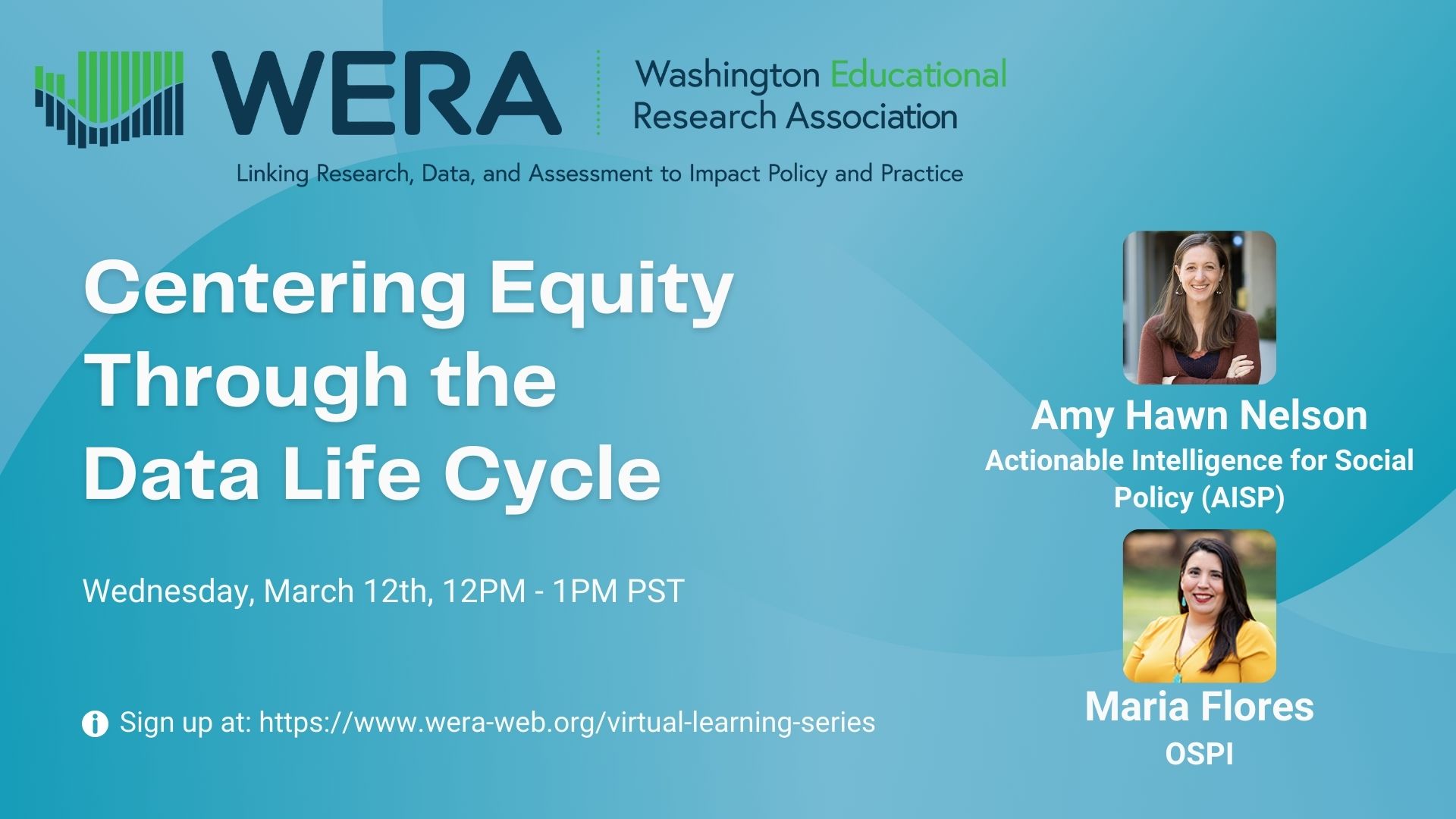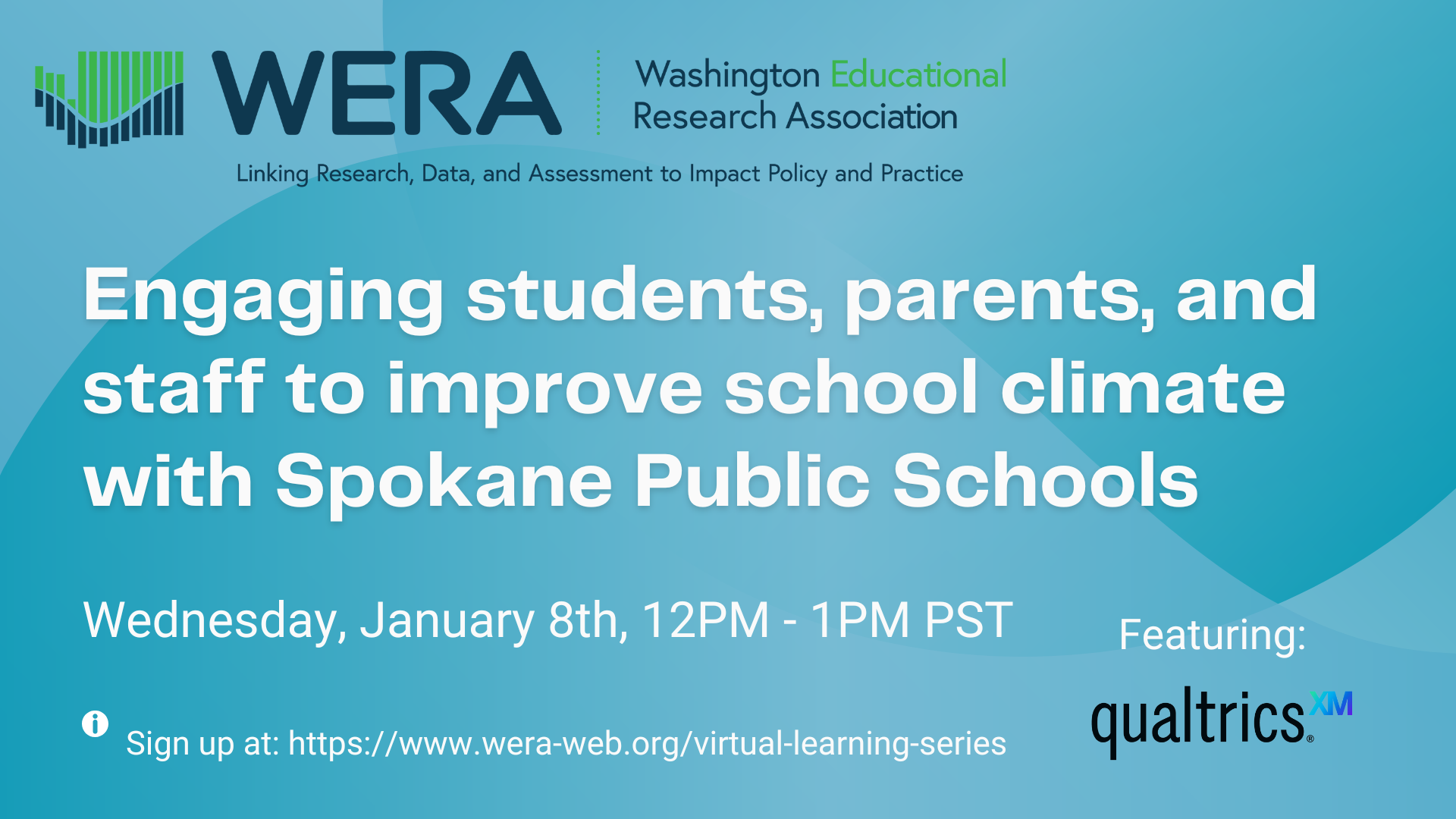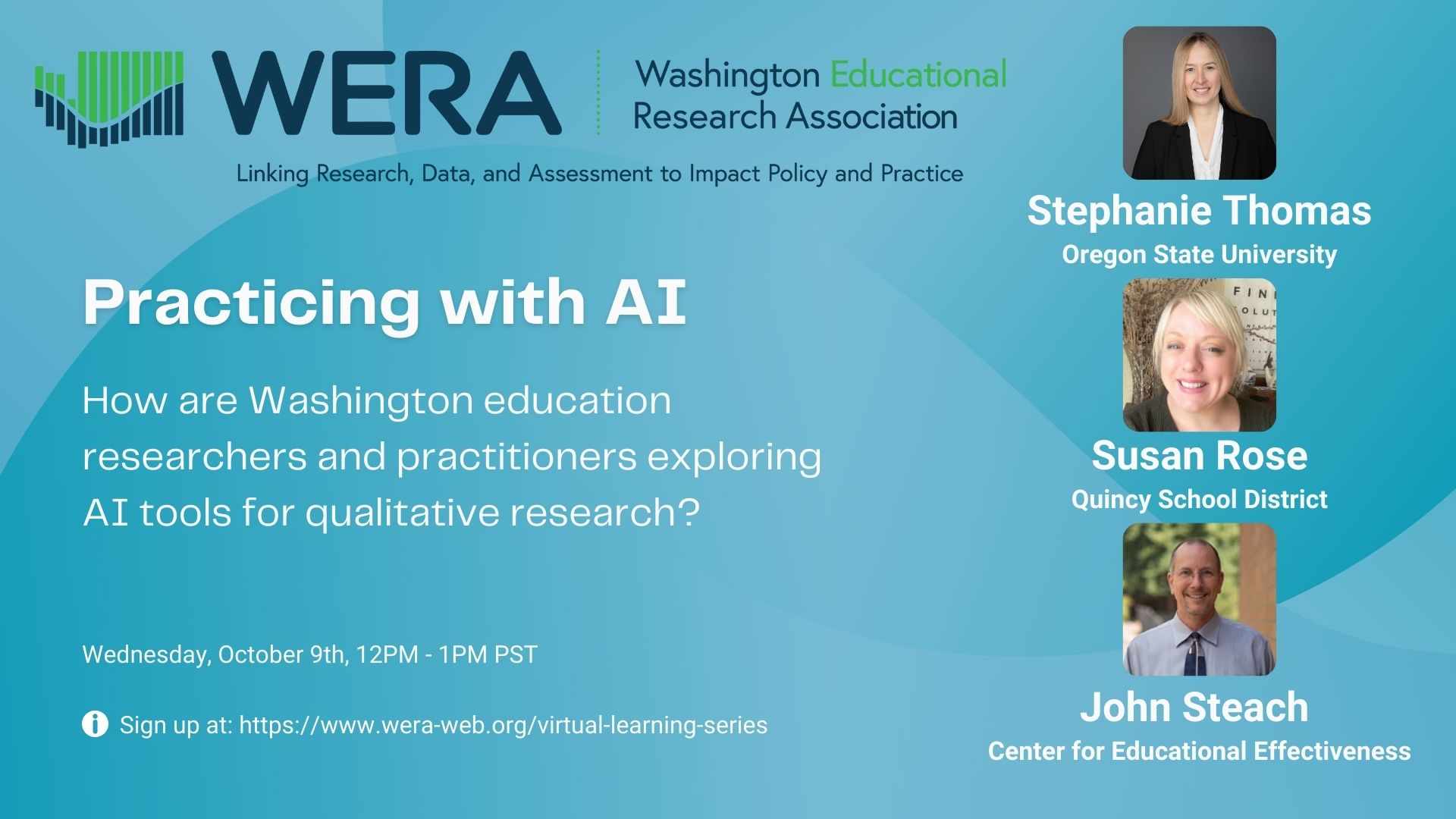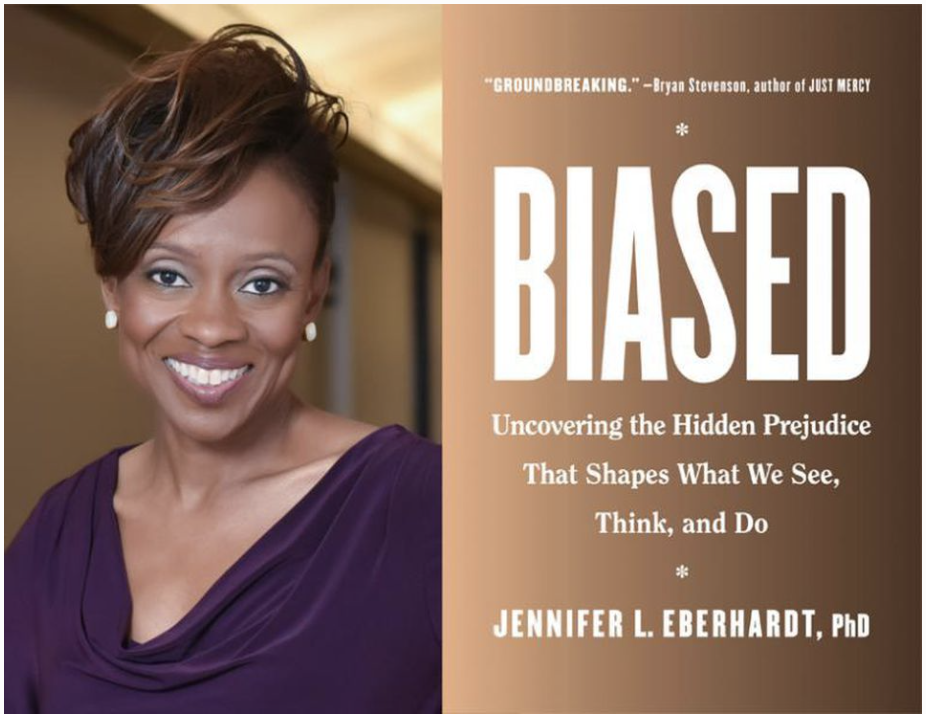|

2025-2026 WERA Webinars
If you are a WERA member, access to video recordings of past Virtual Learning Series events can be found here.
Connecting Systems, Expanding Opportunity: Insights from the Limitless Learning Network
November 20, 2025 from 1:00-2:00 p.m.

Join us on November 20 to learn about the Limitless Learning Network, which brings together practitioners and programs that support students' transitions from high school to postsecondary education across Washington state. The network's 26 partnerships include school district directors of college and career readiness, higher education enrollment staff members, and nonprofit organizations that provide college and career guidance. Limitless aims to strengthen partnership capacity to drive cross-system engagement, action, and outcomes, while supporting long-term scaling of effective strategies statewide. In this webinar, we will discuss the goals and activities of the Network and explore how learnings from the Network can inform broader statewide efforts to improve postsecondary success.
2024-2025 WERA Webinars
Understanding Biliteracy Trajectories in Spanish-English Assessments
May 14, 2025 from noon-1:00 p.m.
White Paper

As education policy and practice rapidly evolve, how can we ensure that equity remains at the center of the decisions we make when collecting, analyzing, and disseminating data?
Join us for an insightful webinar on biliteracy trajectories, where we explore the interconnected development of literacy skills in Spanish and English. Unlike traditional views that treat languages as separate systems, biliteracy trajectories provide a holistic perspective, recognizing that languages can mutually reinforce each other. This approach offers educators a more comprehensive understanding of a student's literacy development.
In this session, we will share insights from our latest white paper, which includes the outcomes of our recent research advancing the original work of Dr. Kathy Escamilla at the Bueno Center at the University of Colorado Boulder. Discover how our findings can enhance your approach to Spanish-English assessments and support your students' biliteracy development.
Don't miss this opportunity to deepen your understanding of biliteracy and its implications for educational practice.
The presenter, Doris Chávez-Linville, is a bilingual educator with expertise in dual-language teaching and migrant education. After beginning her career in Mexico and earning a B.A. in Linguistics, she now serves as Sr. Director of Linguistic and Culturally Diverse Innovation at Renaissance, advocating for marginalized student populations. Pursuing a doctorate in Educational and Organizational Leadership at the University of Pennsylvania, she is an established national and international presenter and writer in bilingual education.
Centering Equity Through the Data Life Cycle
March 12, 2025 from noon-1:00 p.m.

As education policy and practice rapidly evolve, how can we ensure that equity remains at the center of the decisions we make when collecting, analyzing, and disseminating data?
This panel will feature Maria Flores, Executive Director of the Center for Improvement of Student Learning at OSPI and Amy Hawn Nelson, Research Faculty and the Director of Training and Technical Assistance for Actionable Intelligence for Social Policy (AISP), an initiative of the University of Pennsylvania.
Key topics include:
- The AISP Toolkit for Centering Racial Equity Throughout Data Integration and how leaders can use this resource.
- Sensemaking of recent actions and policies to better understand how these may impact education systems and students
- Best practices centering equity in data work to drive meaningful insights and ensure representation without harm
This session will provide practical tools and guidance for education leaders committed to equity and data-informed decision-making. Join us for a thought-provoking conversation on ensuring all Washington students are supported in our education system.
How Ethical & Responsible Voice AI Supports Assessment-Driven Instruction
Wednesday, February 12, 2025 from Noon to 1:00 pm
Wednesday, January 8, 2025 from Noon to 1:00 pm
Join WERA and Qualtrics to learn about how Spokane Public Schools has engaged parents, students and staff to improve school climate.
Practicing with AI: Part II - How AI can enhance your ability to interpret and utilize education data efficiently and ethically
Wednesday, November 13, 2024 from Noon to 1:00 pm
In part 2 of WERA's series on using AI in educational research, participants will hear from leaders at Peninsula School District about understanding and addressing potential biases in AI-driven quantitative research.
Practicing with AI -- How are Washington education researchers and practitioners exploring AI tools for qualitative research?

Wednesday, October 9, 2024 from Noon to 1:00 pm
In this webinar, participants will hear from local leaders about innovative applications of AI in educational settings, the merits of using AI vs. traditional qualitative coding methods, and how to understand and address potential biases in AI-driven qualitative research.
2023-2024 WERA Webinars
What is the New Normal?: Understanding Post-Pandemic Norms
Tuesday, March 19, 2024 from Noon to 1:00 pm
Norms are used widely in education. But what happens when they shift? Come learn about the development of new norms and why they may have a major impact on educator work with students going forward. Join the i-Ready team to learn about interpreting new norms for the 2024-2025 school year, implications for intervention, program eligibility, and why criterion referenced data is so essential.
Presenter: Ashleigh Crabtree, Ph.D., is a skilled measurement professional and psychometrician with deep experience in test design and validation. In her role as the director of assessment implementation at Curriculum Associates, she is focused on bringing technical insights to a wide audience, including teachers, principals, assessment directors, and superintendents.
Building a Balanced Assessment System
February 22, 2024
Not all data is created equal. Not all data conversations are equally effective in creating change. Join Tiffany Seibel (former Assessment Director for Clark County School District), and Elizabeth Nash in exploring three pillars for a Balanced Assessment System:
- Balanced. Balancing assessments for a wholistic data story: (State Assessment, Local Assessments, Formative assessments).
- Organized. What do you do with the data? Who is looking at the data? How often?
- Action-oriented. What conversations are built around the data? How does the data lead to action and change?
Tiffany Seibel
Prior to becoming the National Assessment Consultant for Imagine Learning, Tiffany spent 25 years in K-12 public education, including as the Testing Coordinator and Director of Assessment for Clark County School District in Las, Vegas, Nevada. In these roles, Tiffany experienced first hand the importance of building a Balance Assessment System.
Eliabeth Nash
Prior to becoming a National Curriculum Consultant for Imagine Learning, Elizabeth was an award-winning veteran educator of 20 years in Chicago, Miami-Dade Public Schools.
Scalable and sustainable tools that create efficiencies and improve the effectiveness of your MTSS
May 24, 2023
This session will provide actionable next steps aligned with Washington's MTSS framework, as well as protocols to allow teams to use their screening and intervention data to identify specific areas for focused improvement. Additionally, ideas for evidence-based practices that can be implemented to improve MTSS outcomes will be discussed.
Washington Foundational Literacy Longitudinal Analysis
Presented by Kenneth Tam of Curriculum Associates
May 10, 2023
Washington was selected by the i-Ready analytics team for a customized literacy analysis. The report is a Foundational Literacy Longitudinal Analysis, and reviews data from Washington’s current 3rd graders by looking at their foundational domain literacy placements when they were in 1st grade. The data reveal patterns and trends that may be applicable to district MTSS and literacy work. The participation of colleagues whose focus is assessment, research, teaching & learning, MTSS, and/or literacy instruction is encouraged.
Improving Impact through Evidence - Part 2: Mapping to the Evidence Tool
December 8, 2022
Experts from Results for America, the Rennie Center, and the Annenberg Center at Brown University are hosting a second webinar to discuss their Mapping to the Evidence Tool. You do not need to have attended the November session to benefit from this one.
EdResearch for Recovery’s new Mapping the Evidence tool is designed to help district and school leaders better understand how to carry out evidence-based strategies to see maximum impact on students’ outcomes. The tool helps district and school leaders assess the degree to which their existing programs are aligned with evidence and determine a feasible pathway towards improving alignment and student success.
During this session, you will explore:
- The content and design of the Mapping the Evidence Tool;
- Ways in which this tool would fit in with existing processes in schools and districts; and
- The circumstances under which this tool would be most helpful to schools and districts.
Equity & Text Complexity: Why it Matters Now More than Ever
Presented by Dr. Lynne Kulich
August 24, 2022
Current research on the literacy crisis suggests educators need to rethink instructional and assessment practices. How should early childhood educators implement equitable practices to close reading gaps? Join us for a deep dive into the data, evidence-based practices, and MAP Reading Fluency.
A National Perspective of the Impact of the Covid Pandemic on Student Learning
... and what that might mean for Washington
October 12, 2021
Damian Betebenner, the architect of the Student Growth Percentile, shares his findings from working with student level data from a dozen states to help us better understand the academic impact of the COVID-19 Pandemic on math and ELA learning for different student groups. Learn how different grade levels of students across the nation were impacted by the pandemic as well as how recent missed opportunities for learning compare to the unprecedented impact on students following Hurricane Katrina. Damian's recent findings will invalidate some of your preconceived notions about which student groups were actually impacted the most.
Student Growth in the state of Washington during the 20-21 COVID Era
Facilitated by Fengyi Hung, Ph.D.
August 11, 2021
The COVID-19 pandemic has undoubtedly created challenges in monitoring student achievement and growth trends; at the same time, it amplifies the need to have valid and reliable information about student performance. WERA is striving to provide insight into how district assessment teams can learn from the 2020-21 school year’s student assessment data, identify strengths to build upon, and seek innovative strategies for future work. This year’s student growth webinar panel includes representatives and researchers from three assessment vendors: Curriculum Associates (i-Ready), Renaissance Learning (STAR), and NWEA (MAP).
- DATA TRENDS
- Overall trends in student performance and growth by subgroup, content, and grade, including any equity implications associated with their findings.
- Areas of system strengths and/or highlights of success (i.e. high growth schools).
- PSYCHOMETRICS
- Technical consideration(s) and/or best practices to guide our interpretation of student achievement and growth data (i.e. scale score differences from fall to spring, and from grade level to grade level).
Each vendor addressed the topics above and with plenty of time for questions from the audience throughout the session.
College and Career Readiness in the Covid Era:
Why it’s more important than ever to make more students ready and the tools to do so
March 25, 2021
This presentation explores the increasing importance of all students being ready for college and careers and how both Covid-19 and the changing US economy will make it more challenging for all students as they enter college or the workforce. Several practical frameworks to increase readiness were presented including the Four Keys to College and Career Readiness, Next Generation Assessments, and the Cambridge Assessment International Program. The goal of the presentation was to provide educators with a clear vision of the future of readiness and to help them to prepare for this challenging future.
Presented by Dr. David T. Conley
Professor of Educational Policy and Leadership in the College of Education at the University of Oregon, where he directs the Center for Educational Policy Research. Dr. Conley is a national thought leader in the areas of college and career readiness, student ownership of learning, systems of assessment, and educational accountability.
Thanks to our Platinum Sponsor, Cambridge Assessment International Education for making this presentation possible.
PAST VIRTUAL SESSIONS
Second Annual WERA Equity Book Study
Are we continuing to talk about bias as a “post-racial” society? Haven’t we moved past this discussion in our schools? After all, we learned about bias and addressed racial disparities and inequalities for students of color in our district’s culture competency class. Well, Dr. Jennifer Eberhardt’s Biased, Uncovering the Hidden Prejudice that Shape What We See, Think and Do offers us the opportunity to investigate bias from a scientific and psychological perspective. Informed by Dr. Eberhardt’s personal experience, the book is an immensely insightful analysis of the ways that bias impacts decision making, programs, and public policy. The book takes a deep dive into the science of implicit bias and prejudices through compelling storytelling. How do we address racial disparities and inequities? Eberhardt’s research reveals critical information that can help educators better understand the impacts of bias perspectives on the students and families we serve.

Four Sessions: January 19, February 2, February 16, and March 2, 4-5:15 PM via Zoom
Hot Topics
Washington Educational Research Association (WERA) offers members professional learning webinars called “Hot Topics”. These educational webinars provide timely, relevant information and are typically hosted by people in the field that hold an interest and expertise related to the chosen topic.
Hot Topics Webinar on November 17, 2020: Choosing the Best Dyslexia Screener and What to Do Next
Are you interested in learning more about the approved dyslexia screeners, and the new law around the 2021-22 implementation? If so, join Molly Branson-Thayer and Aira Jackson for this overview of the legislation, as well as a discussion of the literacy skills and assessments that make up the screeners.
Hot Topics Webinar on November 15, 2020: Administration of the SBA Interim Assessments
Anton Jackson, Director of Assessment Development at OSPI, discusses the advantages and limitations of using interim assessments during this period of remote instruction. For districts wishing to determine a way to administer interims, including remotely, important guidance is provided.
Hot Topics Webinar on October 6, 2020: Student Selections and Programming Solutions for the Highly Capable ProgramThis interactive Zoom webinar will be a provides a 15-minute presentation followed by 50 minutes of Q&As to address your concerns about many aspects of highly capable programs this year. Some of the topics covered include suggested timelines, the student selection process, and addressing current instructional programming challenges in the virtual/hybrid classroom model. Organized by Brian Gabele with panelists from Bellevue, Clover Park, Pasco and Renton school districts and the University of Washington.
Hot Topics: Remote Learning Panel Series
The Remote Learning Panel is a special series of WERA Hot Topics addressing the challenges with assessment that school districts face during the pandemic when buildings are closed and learning is remote. The series is organized by Brian Gabele, Director of Assessment and Program Evaluation with Clover Park School District.
Remote Learning Panel, August 18, 2020 – Identifying English Language Learners in the Virtual Classroom
How do we identify students who will need English language development support when we are not able to screen in-person with ELPA21? This session tackles that issue with the experts from OSPI: Veronica Maria Gallardo, the Director of Migrant & Bilingual Education, Leslie Huff, the English Language Proficiency Assessment Coordinator, and Amy Ingram, Bilingual Program Supervisor. After the presentation from the OSPI team, Kent School District’s Director of Multilingual Education, Will Williams, moderated a panel discussion. The panel wrestled with how to implement this new process for provisionally identified students and provide communication for their families.
Remote Learning Panel, August 12, 2020 – Virtually Administering WaKIDS Assessment
As Washington schools plan for starting school remotely, how teachers collect evidence for the observational assessment component of WaKIDS in kindergarten programs requires adaptations and creativity. OSPI’s Director of Early Learning, Karma Hugo, and WaKIDS Assessment Specialist Yoona Park presented the latest on WaKIDS, including new resources from OSPI and Teaching Strategies GOLD. Following the presentation, a panel of early learning educators responded to the information from OSPI, answered questions from the field, and shared strategies for success. Panelists were Alyssa Hayes, from Tahoma School District, Jessica Wallace from Bellingham Public Schools, Laurie Sjolund from Sumner-Bonney Lake School District, Lindsay Callahan from Clover Park School District and Whitney White from Puget Sound ESD.
Hot Topics Webinar on April 28, 2020 - ClimeTime Professional Learning and Instructional Resources
Across Washington, the students have been learning about the scientific dimensions of climate change through ClimeTime. This initiative is facilitated by the Office of Superintendent of Public Instruction (OSPI) —in collaboration with the UW Institute for Science + Math Education—through a Washington State budget proviso since 2018-2019 originally requested by Governor Inslee. Watch this webinar to learn more about professional development opportunities through the network of nine Educational Service Districts and six community-based organizations (CBOs) that address the Next Generation Science Standards and climate science. During the webinar, Hilary Loeb with Puget Sound Educational Service District, Deb Morrison from the University of Washington and Ellen Ebert from OSPI will share lessons learned from the first year of the project and resources for teachers and home-based learning.
Hot Topics Webinar on March 10, 2020 – Inclusionary Practices Project Takes Flight!
The last session the legislature appropriated $25 million to OSPI for the Inclusionary Practices Project, an opportunity to grow, deepen and enhance professional development and K-12 systems to support core instruction in general education settings for all students, including students with disabilities. The project has launched and is in flight. View this webinar to hear from OSPI leaders and partners about the project’s navigation and destinations now and in the school year to come.
Hot Topics Webinar on October 21, 2019- Washington State Dyslexia Advisory Council
WERA held a “Hot Topics” webinar on October 21, 2019. It focused on the charge of the Washington State Dyslexia Advisory Council, their recent work to identify literacy screening tools and what this means to districts across Washington. Presenters on the webinar were: Aira Jackson, OSPI English Language Arts Director and Dyslexia Advisory Council members - Molly Branson-Thayer, Senior Director at Cultivate Learning at the University of Washington, and Elizabeth Coon, Literacy Specialist in Seattle Public Schools. Facilitating the discussion was Nasue Nishida, WERA Board Member and Executive Director at the Center for Strengthening the Teaching Profession.
|